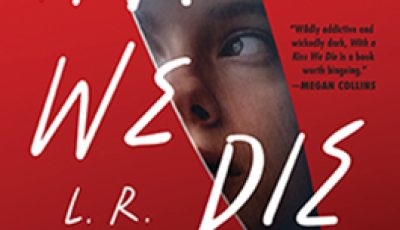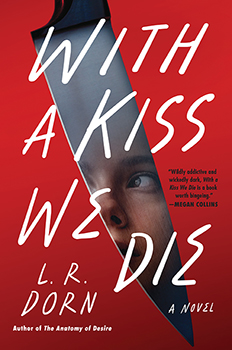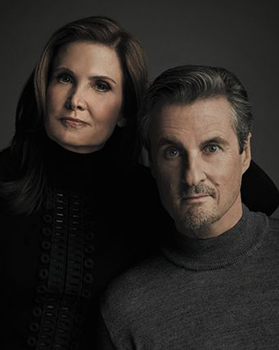

Crime Fiction With a Kiss We Die by L. R. Dorn
I’m Ryanna Raines. And welcome to “The Raines Report.”
Ryanna Raines is the host of a popular true-crime podcast. Her specialty is investigative journalism, her style is truth-seeking moxie, and with millions of listeners along for the ride, her star is rising. But when an intriguing message is left on her tip-line, the reporter is pulled into the most challenging case of her career.
The mangled bodies of a husband and wife have been discovered in their multi-million-dollar estate in Southern California. The prime suspects are their twenty-two-year-old son and his girlfriend, two college theater students who are now facing arrest and indictment. In a surprising move, they only want to speak with Ryanna, offering exclusive interviews in exchange for her help getting their side of the story told.
Instead of a badge or a weapon, Ryanna carries her voice recorder onto the battlefield of the high-profile murder investigation. Through a series of interviews, Ryanna examines her subjects from multiple angles and diverse points of view, breaking past the walls of “he said, she said” to pierce at a dark and horrible truth.
Written in the style of a true-crime podcast, WITH A KISS WE DIE is a heart-racing mystery and thought-provoking tale about love and secrets that unfolds episode by episode as it hurtles towards an explosive conclusion. L. R. Dorn has crafted a suspenseful examination of our cultural obsession with true crime, the complicated moral obligations between journalists and their subjects, and the often-deadly line between performance and deceit.
The writing team of L. R. Dorn sat down with TheBigThrill to discuss their latest thriller, WITH A KISS WE DIE:
Can you pinpoint a moment or incident that sparked the idea for this book?
WITH A KISS WE DIE started with the convergence of two things we’d been discussing (discussion being foundational to our collaboration). First was our desire to create a series character whose job is to investigate crimes—but doing a modern variation on the traditional PIs, cops, forensic workers, defense lawyers, et al. We’d become dedicated listeners of true crime podcasts back to when Serial first released and at one point we said, “What if she (we knew our investigator would be female) is a podcasting crime journalist?” The second idea was born out of a true crime from 1985 that had continued to haunt us since reading a book, watching a documentary, and listening to a podcast about the case. The bodies of Nancy and Derek Haysom were found in their affluent Virginia home brutally stabbed dozens of times, their throats slit ear to ear. No breaking and entering, nothing stolen, the couple had no enemies. Police were baffled. Eventually the couple’s 22-year-old daughter, Elizabeth, and her boyfriend, Jens Soering, became the main suspects. Both proclaimed their innocence. Looking at these two gifted students who were in the raptures of a college romance, and learning their personal histories of privilege, it was nearly impossible to imagine that either (or both) could have committed an act of violence so utterly savage. That perplexing paradox between this horrific double homicide and these relatively normal college kids was something we couldn’t get out of our heads. Once we matched our crime investigator with this crime, we were launched on a two-year writing journey.
When you first created your protagonist for this book, did you see an empty space in crime lit that you wanted to fill? What can you share about the inspiration for that character?
We’ve always loved detective fiction. But it’s a crowded field, and if we were going to enter it, we felt we had to do something to distinguish our “detective” from all who came before her. Journalists have been the leads in plenty of crime novels, but the podcasting crime journalist is unique. The process for getting her voice out into the world requires optimizing her reporting for the audio medium. Using the crime investigation podcast as our conceit for how the story would be presented meant we had to adopt a new vocabulary for getting characters from A to B to C. We had to limit ourselves to spoken-word/recorded sources, and that constraint challenged us to free up our imagination to “show” within a format that is all “tell.” We also wanted to have these meta dialogues between our journalist and her podcast producer on the ethics of their reporting—as that reporting is being conducted. Where is the line between private tragedy and public entertainment? At what point does impartiality cross over into advocacy? This ongoing self-awareness of how our investigators are doing their jobs is meant to bring the reader into the conversation, to encourage them to consider the mechanics and dilemmas that are inherent to true-crime journalism.
Were there any particular books, movies, or songs that were knocking around in your head while you were writing this one?
Our storytelling in WITH A KISS WE DIE was almost exclusively influenced by true crime podcasts, specifically the ones by investigative journalists who go out and find the story using the tools of their trade. The backbone of all true-crime investigation podcasts is the recorded interview. The spine of our narrative is a series of interviews with the college student suspects, first recorded together as they claim their innocence and then recorded individually as their fortunes change. On our podcast shortlist was “The Lady Vanishes” from 7NEWS Australia, “CounterClock” from audiochuck, and “Canary” from The Washington Post. The true-crime podcast is a relatively recent evolution in the way crime stories are told and consumed. The podcast form has its own narrative architecture and conventions and tropes that mark it apart from crime fiction in books and on TV. Understanding the different rhythms and distinctive cadences was crucial to capturing the audio medium on the printed page.
In addition to a great read, what do you hope readers will take away from this story?
There is a point in our book where the mother of one of the murder suspects asks Ryanna Raines, our podcaster and professional truth seeker, “What if in the end you still can’t be sure what’s fact and what’s fiction?” Ryanna has to contend with this quandary at every turn in the story. Where does objectivity end and subjectivity begin? How to sift out facts from statements that are a convoluted interweaving of truth and falsehoods? Real life tends to be messier and more complicated than it’s portrayed in commercial fiction. We wanted to show some of that messiness in the relationship between our journalist and her subjects. And don’t we all have to find ways of reconciling ourselves to the reality that truth can be slippery, elusive, an ever-moving target that rarely gives up a bulls-eye?
L. R. Dorn is the pen name for Matt Dorff and Suzanne Dunn. Matt is a Southern California native and graduate of the USC School of Cinema who has written, produced, and/or directed over 60 hours of dramatic television (CBS, NBC, ABC, Showtime, HBO, Lifetime). He is a member of the Writers Guild of America West. Suzanne is a two-time Emmy Award winner for interactive programming who has written two movies for television. She grew up in Bucks County, Pennsylvania, and earned degrees from Penn State and the University of Chicago. She is a member of the Producers Guild of America and Academy of Television Arts & Sciences.
To learn more, visit lrdorn.com.
- LAST GIRL MISSING with K.L. Murphy - July 25, 2024
- CHILD OF DUST with Yigal Zur - July 25, 2024
- THE RAVENWOOD CONSPIRACY with Michael Siverling - July 19, 2024


